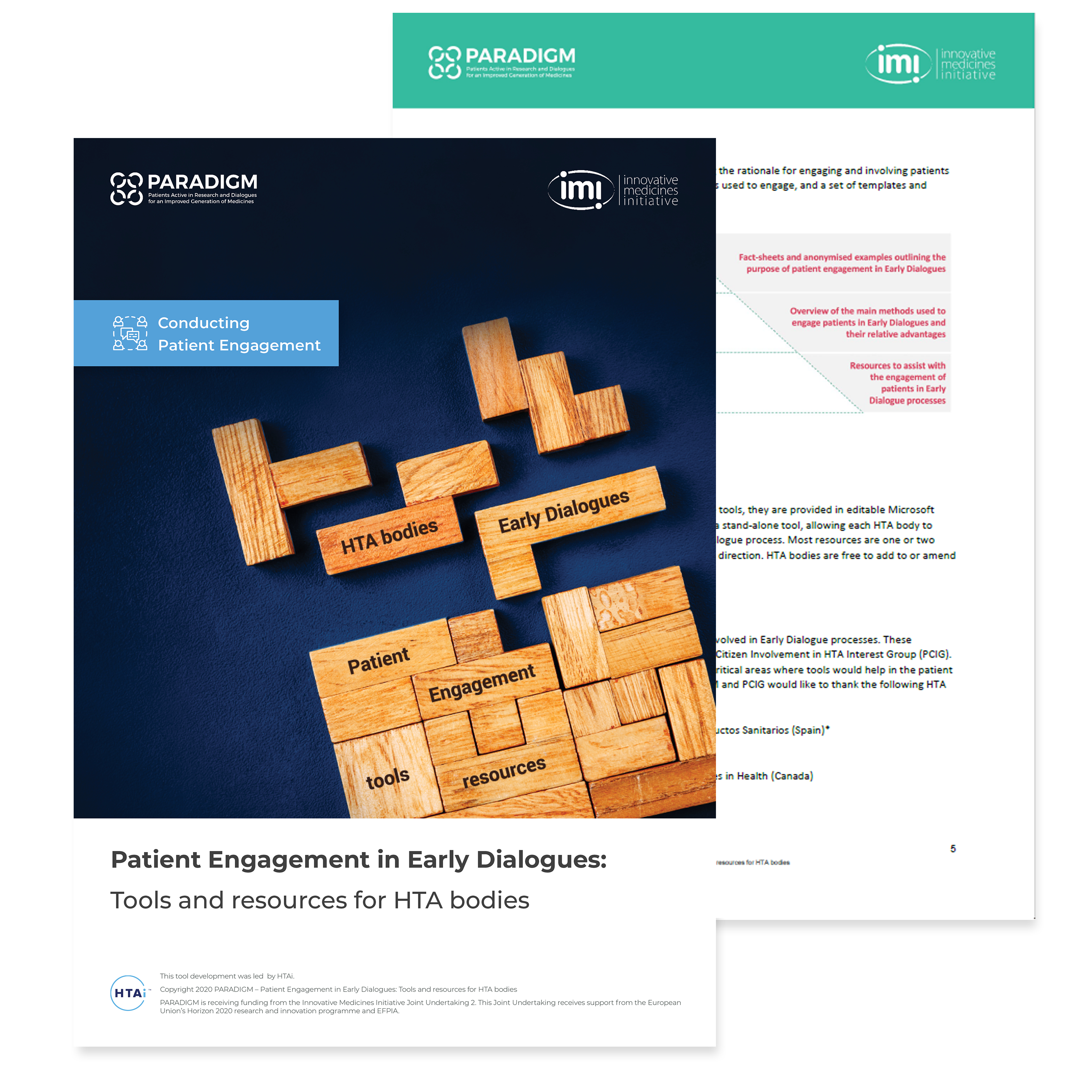
Patient Engagement in Early Dialogues: Tools and resources for HTA bodies
Background/Rationale
Early Dialogues with regulators and health technology assessment (HTA) bodies are a well-established processes in which medicines developers have the opportunity to discuss their research plans and gain advice and feedback on their planned approach. Patient engagement and involvement in these dialogues is needed to ensure that patient experience, perspectives and knowledge is captured as part of this dialogue.
Engagement of patients in these Early Dialogue processes is an emerging discipline among HTA bodies, with a range of methods being piloted and used. There remains a clear need to provide adaptable tools and resources to simplify patient engagement processes for HTA bodies and provide guidance on suitable methods and approaches.
Objective of the toolkit
The tools in this toolkit are for HTA bodies to adapt and use when engaging patients in Early Dialogue processes. Each tool has been created to be succinct and is provided in Microsoft Word so that HTA bodies can amend or add to each tool based on their own specific processes and needs.
Using this tool, HTA bodies will be able to adapt the guidances, checklists and fact-sheets to their own specific process, offering them a fast route to develop the resources needed to engage patients in Early Dialogues.
Summary of the content
This resource contains three main sections covering the rationale for engaging and involving patients in Early Dialogues, an overview of the main methods used to engage, and a set of templates and checklists related to various methods:
• Rationale for patient involvement in HTA Early Dialogues
• Methods used to engage patients in HTA Early Dialogues
• Resources for HTA bodies to engage patients in Early Dialogues
Outcomes/ Key Message
There is a clear rationale for involving patients in Early Dialogues. A range of tools have been developed to support HTA bodies to overcome barriers to engaging patients in Early Dialogues. These tools should be reviewed and adapted further in response to research, evaluation and stakeholder experiences as this relatively new field develops.
Methodology
Methodology HTA
The Early Dialogue HTA tools were built using a collaborative process centred on three structured interactions with HTA bodies. Attendees at these workshops were members of HTA bodies and were recruited through two networks: The EUnetHTA Early Dialogues Working Party and The HTAi Patient & Citizen Involvement in HTA Interest Group. Care was taken to ensure that attendees included:
- HTA bodies with an established Early Dialogue process that includes patient engagement
- HTA bodies with Early Dialogue process that do not include patient engagement
- HTA bodies with experience of Early Dialogues as part of EUnetHTA Early Dialogues
- HTA bodies with no experience of patient engagement
Furthermore, it was identified during the process that input from the East European perspective was missing. The participation and perspective of Hungary through NIPN was obtained part way through the project.
To gain the perspectives and input from this diverse group of HTA bodies, structured workshops were held to determine the expectations and needs of HTA bodies conducting patient engagement as part of an Early Dialogue process. This was conducted in three stages:
1. Scoping meeting – with HTA bodies experienced in Early Dialogues
- To identify the thematic areas important for a HTA early dialogue
- To identify some of the critical issues that need to be considered when engaging patients in Early Dialogues
- The outputs of this interaction were used to design a structured workshop with a wider group of HTA bodies
2. Expectations and needs workshop – with HTA bodies familiar with / unfamiliar with patient engagement in Early Dialogues
- To clarify the rationale for involving patients in Early Dialogue processes
- To outline the methodologies currently used for patient engagement during Early Dialogue
- To identify the critical need for tools for HTA bodies that could simplify patient engagement in Early Dialogues
- The outputs of this workshop were used to draft outline tools and to provide structure for the third interaction
3. Tool development workshop – with HTA bodies familiar with / unfamiliar with patient engagement in Early Dialogues
- To develop outlines of tools
- To identify current materials and resources that could feed into any new tools
- To prioritise the tools to be developed as part of the PARADIGM Toolbox
- The outputs of this workshop were used to draft the tools as part of the PARADIGM Toolbox
Following these interactions, a core editorial team comprising of members of HTAi Patient and Citizen Involvement in HTA drafted the tools, based on the outputs of the HTA workshops and materials shared by the HTA bodies. These tools were first reviewed by the HTAi team members and shared for comment with HTA bodies NICE, CADTH, EUnetHTA Early Dialogue Working Party, HAS for comment. In parallel, tools that were also patient-facing such as fact-sheets, letters and feedback forms were shared for consultation with PARADIGM consortium members and for public consultation.
Contributors
|
Main authors
|
|
|
Contributors The following contributors attended and contributed to the HTA workshops and reports where the purpose, outline and overall content of this toolkit were defined.
The following contributors from the PARADIGM consortium attended the workshops and provided notes, insights and direction.
|
|
|
Coordination
|
Editorial committee
|


